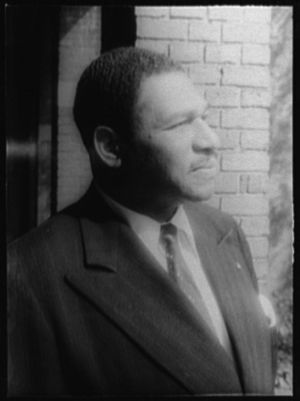Frederick O'Neal facts for kids
Quick facts for kids
Frederick O'Neal
|
|
|---|---|

O'Neal in 1958
|
|
| Born |
Frederick Douglas O'Neal
August 27, 1905 Brooksville, Mississippi, U.S.
|
| Died | August 25, 1992 (aged 86) New York, New York, U.S.
|
| Nationality | American |
| Occupation |
|
| Years active | 1927–1980 |
Frederick O'Neal (August 27, 1905 – August 25, 1992) was an American actor, theater producer, and television director. He helped start important theater groups like the American Negro Theater and the British Negro Theatre. He also made history as the first African-American president of the Actors' Equity Association, a union for actors. O'Neal was also known for his important work as a trade union leader, helping to improve conditions for workers.
Contents
Early Life and Acting Start
Frederick Douglas O'Neal was born in Brooksville, Mississippi. He was named after Frederick Douglass, a famous leader who fought to end slavery. Frederick's father was a teacher and a merchant. He grew up with seven brothers and sisters.
In 1919, after his father passed away, his family moved to St. Louis. That's where Frederick began acting professionally in 1927.
Moving to New York and Broadway Success
In 1936, O'Neal moved to New York City. He worked as a laboratory assistant during the day and studied acting at night. He first performed in New York with the Civic Repertory Theatre.
Frederick O'Neal felt that Black actors didn't have enough good roles or opportunities in theater. So, in 1940, he helped create the American Negro Theater. He acted in many of their plays.
In 1944, he made his big debut on Broadway in the play Anna Lucasta. He played the part of a greedy brother-in-law. His performance was a huge success! He won several important awards, including the Clarence Derwent Award for best new actor and the New York Drama Critics' Award for best supporting actor. He even played the same role in Chicago and London, and in the movie version of the play.
Film and Television Roles
O'Neal also received praise for his role as Lem Scott in the play Take a Giant Step in 1953. He later played this role in the movie version too. He appeared in other films like Pinky, No Way Out, and Something of Value.
In 1953, O'Neal filmed a pilot episode for a TV show with Sammy Davis Jr. This show was special because it showed African-Americans as struggling musicians, not in silly or stereotypical roles. The show featured talented actresses like Ruth Attaway and Jane White, and Frances Davis, who was the first Black ballerina to dance for the Paris Opera. Unfortunately, the TV network couldn't find a sponsor, so the show was never aired.
Frederick O'Neal continued to act on television. In 1955, he played a detective in the mystery show Danger. He was also often seen on shows like Kraft Suspense and Hallmark Hall of Fame. From 1961 to 1963, he played Officer Wallace on the comedy show Car 54, Where Are You?. In 1964, he was in an episode of the drama Breaking Point that featured many Black actors.
He also helped narrate an educational record called "Great Negro Americans" with Hilda Simms.
Leading Theater and Union Work
Frederick O'Neal was a true leader behind the scenes. In 1927, he started the Aldridge Players in St. Louis, a theater group for Black actors named after the famous actor Ira Aldridge.
In 1940, he was a key person in organizing Harlem's American Negro Theatre. This theater became a starting point for many famous actors and writers, including Harry Belafonte, Ruby Dee, Sidney Poitier, Earle Hyman, and Alice Childress. In 1948, he also helped create the British Negro Theatre.
Becoming a Union President
In 1958, O'Neal joined the council of the Actors' Equity Association, which is a union that protects actors' rights. Six years later, in 1964, he made history by becoming the president of the Actors' Equity Association. He was the first African-American to hold this important position, serving until 1973. After he left office, he was given the special title of "president emeritus" for his long service.
O'Neal was also elected president of the Associated Actors and Artistes of America in 1970, another major union for performers. He retired from this role in 1988. He was also a vice president of the AFL-CIO, one of the largest groups of labor unions in the United States.
Honors and Recognition
Frederick O'Neal received many awards and honors for his contributions.
In 1975, he was inducted into the Black Filmmakers Hall of Fame. This organization honored him again in 1990.
The NAACP, a leading civil rights organization, named him their "Man of the Year" in 1979. He was also honored by the National Urban League and the Black Heritage Association.
He received several special degrees from universities, including an Honorary Doctor of Human Letters from St. John's University in 1981.
Death
Frederick O'Neal passed away at his home in Manhattan on August 25, 1992, at the age of 86, after a long illness. He was survived by his wife, Charlotte Talbot Hainey.
Images for kids
 | Misty Copeland |
 | Raven Wilkinson |
 | Debra Austin |
 | Aesha Ash |


